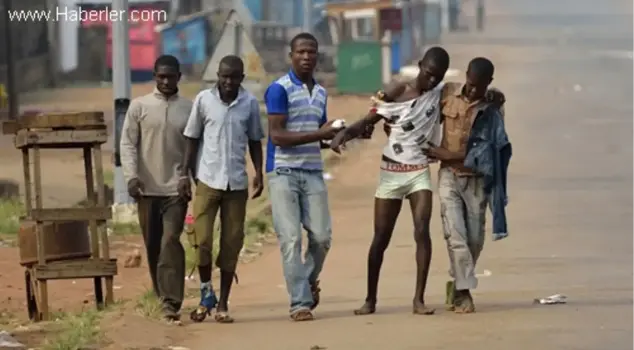
13.01.2014 17:00
In the Central African Republic the search is now on for a new interim president. After a weekend of renewed violence and chaos, Bangui residents have been telling DW about their hopes for the new leadership. Hundreds of deserting Central African Republic (CAR) troops and police reported back for duty on Monday after the country's interim leader Alexandre Ferdinand Nguendet promised that the "anarchy was over." Members of the security forces had either deserted for fear of being killed, or had joined a Christian militia opposing Michel Djotodia, the mainly Christian country's first Muslim interim president, who resigned on Friday. Nguendet heads the national transitional council, which the country's Constitutional Court has given two weeks to elect a successor to Djotodia. Gervais Lakosso, a transitional council member, told DW's French for Africa service, that there were "unfortunately, secret, underhand negotiations in progress involving people we do not want." He said the transition
In the Central African Republic the search is now on for a new interim president. After a weekend of renewed violence and chaos, Bangui residents have been telling DW about their hopes for the new leadership.
Hundreds of deserting Central African Republic (CAR) troops and police reported back for duty on Monday after the country's interim leader Alexandre Ferdinand Nguendet promised that the "anarchy was over."
Members of the security forces had either deserted for fear of being killed, or had joined a Christian militia opposing Michel Djotodia, the mainly Christian country's first Muslim interim president, who resigned on Friday.
Nguendet heads the national transitional council, which the country's Constitutional Court has given two weeks to elect a successor to Djotodia.
Gervais Lakosso, a transitional council member, told DW's French for Africa service, that there were "unfortunately, secret, underhand negotiations in progress involving people we do not want." He said the transitional council had a "huge responsibility" and "we will do everything in our power to ensure that the person who is elected really is the choice of the Central Africans."
'Not a politician'
Other people DW spoke in Bangui, capital of CAR, were more forthright about what they expected of the new interim government. "The president of CAR should be a soldier and the prime minister a civilian, ideally a technocrat or somebody from civil society, but not a politician," one Bangui resident said.
Another resident maintained that there weren't that many options available. "We need somebody with a religious background. We've had enough of politicians, who take us for fools," he said.
A third Bangui resident told DW that the new interim president must be somebody who is competent and "can demonstrate that he doesn't belong to one particular side, somebody who doesn't have a record of political militancy."
Lea Koyassoum Doumta, deputy speaker of transitional council, told the IPS news agency the new leader "must be somebody who can unite Central Africans, restore security, ease tensions, put everybody back to work and pave the way for free, democratic and transparent elections: "
Fresh elections have to be held in CAR by February 2015.
Settling scores
The transitional council was set to begin consultations with politicians and civil society representatives on Monday.
Djotodia is now in exile in Benin. His departure was followed by two consecutive nights of intense gunfire in some Bangui neighborhoods. The local Red Cross said 13 people had been killed in "score-settling."
Muslim youths claiming to seek revenge for Djotodia's exit set fire to a church, and children stole items form a mosque before setting it alight, saying they were avenging the death of a Christian the night before.
Djotodia stepped down along with his prime minister Nicolas Tiangaye at a regional summit in Chad, amid mounting pressure over his failure to stem the violence between Muslims and Christians.
Djotodia had been criticized for failing to rein in the Muslim Seleka rebels who had brought him to power in March 2013.
Challenges facing the new interim president
There had been hopes that Djotodia's resignation would calm the violence, but it flared up again over the weekend, with reports of looting and cannibalism.
But on Sunday rival militiamen struck a local truce in the Bangui neighborhood of Bimbo. The deal was mediated by French and African peacekeepers and the CAR's chief of staff General Ferdinand Bomboyeke confirmed witness accounts of the laying down of arms.
The deals offers a rare glimmer of hope in a country in which the new interim president will face a climate of sectarian hatred, the displacement of nearly a million people, an unprecedented humanitarian crisis, a paralyzed government administration and an economy in chaos.
Who might be the new interim president? David Smith, director of the media organization Okapi Consulting in Johannesburg, told DW's Africalink show that "there are no bright lights that spring to mind," but the general feeling in the Central African Republic was that Nguendet "will put his name forward."